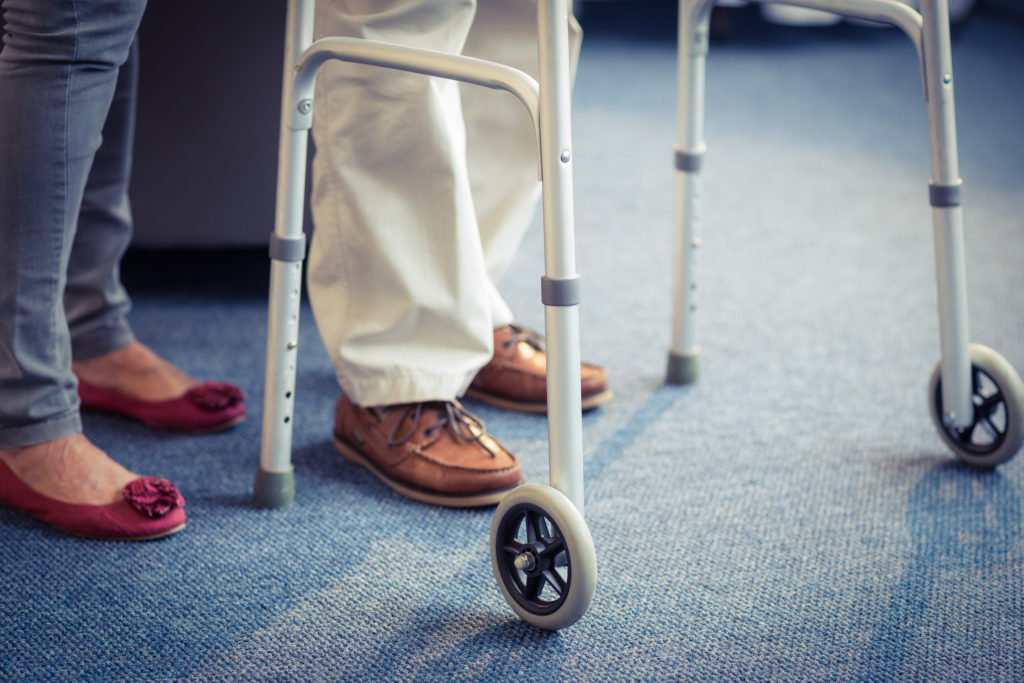Senior Health
Many drugs and medical devices help seniors live better quality lives. However, some may cause more harm than good. Find out which ones are linked to harmful side effects.
About Senior Health
 As people age, health issues may arise that require various prescription medications or medical devices for treatment. While many drugs help reduce symptoms of health conditions, some may have unintended side effects that can increase the risk of serious, lifelong side effects. In fact, one in six people aged 65 or older will have one or more dangerous reactions to a medication.
As people age, health issues may arise that require various prescription medications or medical devices for treatment. While many drugs help reduce symptoms of health conditions, some may have unintended side effects that can increase the risk of serious, lifelong side effects. In fact, one in six people aged 65 or older will have one or more dangerous reactions to a medication.
Seniors can help protect their health by tracking their prescriptions and being careful about their medications; however, drugs and devices can still take a toll on the body. The most common drugs that cause adverse side effects in the elderly population include
- Diabetes medication
- Weight loss drugs
- Respiratory disease therapy
- Alzheimer’s disease treatment
Unfortunately, each year thousands of seniors experience some of the dangerous side effects linked to prescription drugs. To decrease the risk of medication-related issues, older adults should keep a list of all medications, fill prescriptions at one pharmacy, speak with a doctor about severe side effects, and have a doctor or pharmacist review prescribed medications each year.
Diabetes Medication
 Although a staggering 29.1 million Americans have diabetes, one in four individuals do not know they have the disease. Type 2 diabetes is a common disease among older people, but treatment varies depending on an individual’s specific lifestyle. Generally, digested food breaks down into one of the simplest forms of sugar, known as glucose. Yet, in type 2 diabetes, the body is unable to keep blood sugar levels normal. Not managing diabetes properly can eventually lead to permanent eye, kidney, nerve or heart problems.
Although a staggering 29.1 million Americans have diabetes, one in four individuals do not know they have the disease. Type 2 diabetes is a common disease among older people, but treatment varies depending on an individual’s specific lifestyle. Generally, digested food breaks down into one of the simplest forms of sugar, known as glucose. Yet, in type 2 diabetes, the body is unable to keep blood sugar levels normal. Not managing diabetes properly can eventually lead to permanent eye, kidney, nerve or heart problems.
As type 2 diabetes worsens over time, doctors may prescribe a drug – like Januvia– to help lower blood sugar levels. With a growing need for medications to treat type 2 diabetes, manufacturers are promptly releasing drugs claimed to effectively manage the disease. Recently though, studies have suggested a link between some diabetes medications and severe side effects such as pancreatic cancer, thyroid cancer, kidney failure, and increased risk of death from heart-related conditions. For instance, lawsuits contend that Merck & Co., Inc., the manufacturer of Januvia, failed to provide adequate information about its power to overstimulate the pancreas. This overstimulation can lead to harmful side effects such as inflammation, pancreatitis or pancreatic cancer.
While medication is often used to help manage type 2 diabetes, other factors can also improve your health. Lifestyle changes like eating right, exercising regularly, getting enough sleep, losing weight, and reducing stress can all impact blood sugar levels and improve how a person with type 2 diabetes feels.
Weight Loss Supplements
 As older age affects the lungs, it’s important for individuals to work toward preventing future breathing problems. Due to symptoms that are easily overlooked, it often takes longer for respiratory health concerns to be diagnosed. Increasingly common among the elderly population, Chronic obstructive pulmonary disease (COPD) is a progressive disease that makes it difficult to breathe. Frequent symptoms of COPD may include:
As older age affects the lungs, it’s important for individuals to work toward preventing future breathing problems. Due to symptoms that are easily overlooked, it often takes longer for respiratory health concerns to be diagnosed. Increasingly common among the elderly population, Chronic obstructive pulmonary disease (COPD) is a progressive disease that makes it difficult to breathe. Frequent symptoms of COPD may include:
- Shortness of breath
- Chronic coughing that produces sputum
- Wheezing
- Chest tightness
- Blueness of lips or fingernail beds
Medical devices similar to Spiriva are typically used to help keep airways open and improve an individual’s breathing. Initially, the promising results gained the attention of those affected by COPD. Over time though, lawsuits against Spivia have become frequent after research has indicated its use may raise the chances of a heart attack, sudden cardiac arrest or stroke.
Even with ongoing treatment, individuals living with COPD should try practicing controlled breathing, avoiding smoke and air pollution, eating healthy foods, and exercising regularly. It’s also a good idea to check in with a doctor regularly.
Respiratory Medications
 A progressive disease that damages memory and other mental capabilities, Alzheimer’s causes brain cells to degenerate over time. Affecting more than 5.1 million individuals over the age of 65, Alzheimer’s disease is the most common cause of dementia. Signs and symptoms of Alzheimer’s may vary from one person to the next, but characteristics often involve:
A progressive disease that damages memory and other mental capabilities, Alzheimer’s causes brain cells to degenerate over time. Affecting more than 5.1 million individuals over the age of 65, Alzheimer’s disease is the most common cause of dementia. Signs and symptoms of Alzheimer’s may vary from one person to the next, but characteristics often involve:
- Noticeable short-term memory loss
- Difficulty completing recurring tasks
- Misplacing things
- Inability to recognize familiar people
- Confusion about the current time or location
Used to treat symptoms of Alzheimer’s, medications resembling Aricept claim to improve the function of nerve cells in the brain. While those with mild to moderate Alzheimer’s disease take a lower dosage of the drug, others facing moderate to severe symptoms are often prescribed a much higher dosage. Though it’s unknown if a higher amount of Aricept is more effective than the lower dosage, users can experience much greater side effects including pneumonia, massive gastrointestinal bleeding, esophageal rupture, and death.
These serious effects caused users to file lawsuits against the manufacturer for not addressing the safety concerns sooner. Higher doses are said to be much more toxic than lower doses; however, the package does not contain a black box warning to alert consumers of the drug’s danger.
Along with drugs that help treat cognitive symptoms, it’s important for people with Alzheimer’s to focus on achieving good overall health. Making a routine out of exercising, eating nutritious meals and creating a safe environment will support cognitive health and can help delay Alzheimer’s disease. Additionally, connecting with local support groups will help with the mixture of emotions an individual may face. Staying active – mentally, physically and socially – is key to a person’s well-being.
Alzheimer's Treatment
 A progressive disease that damages memory and other mental capabilities, Alzheimer’s causes brain cells to degenerate over time. Affecting more than 5.1 million individuals over the age of 65, Alzheimer’s disease is the most common cause of dementia. Signs and symptoms of Alzheimer’s may vary from one person to the next, but characteristics often involve:
A progressive disease that damages memory and other mental capabilities, Alzheimer’s causes brain cells to degenerate over time. Affecting more than 5.1 million individuals over the age of 65, Alzheimer’s disease is the most common cause of dementia. Signs and symptoms of Alzheimer’s may vary from one person to the next, but characteristics often involve:
- Noticeable short-term memory loss
- Difficulty completing recurring tasks
- Misplacing things
- Inability to recognize familiar people
- Confusion about the current time or location
Used to treat symptoms of Alzheimer’s, medications resembling Aricept claim to improve the function of nerve cells in the brain. While those with mild to moderate Alzheimer’s disease take a lower dosage of the drug, others facing moderate to severe symptoms are often prescribed a much higher dosage. Though it’s unknown if a higher amount of Aricept is more effective than the lower dosage, users can experience much greater side effects including pneumonia, massive gastrointestinal bleeding, esophageal rupture, and death.
These serious effects caused users to file lawsuits against the manufacturer for not addressing the safety concerns sooner. Higher doses are said to be much more toxic than lower doses; however, the package does not contain a black box warning to alert consumers of the drug’s danger.
Along with drugs that help treat cognitive symptoms, it’s important for people with Alzheimer’s to focus on achieving good overall health. Making a routine out of exercising, eating nutritious meals and creating a safe environment will support cognitive health and can help delay Alzheimer’s disease. Additionally, connecting with local support groups will help with the mixture of emotions an individual may face. Staying active – mentally, physically and socially – is key to a person’s well-being.
Seniors and Heart Health
 In 2013, the American Heart Association found that over 1 in 3 American adults had one or more types of cardiovascular disease — that amounts to over 83 million Americans. Just over half of American adults with heart disease were estimated to be seniors in the 60+ age range. This makes it all the more important for seniors to be cautious about their health, and conscious of potential side effects associated with blood thinners or high blood pressure medications.
In 2013, the American Heart Association found that over 1 in 3 American adults had one or more types of cardiovascular disease — that amounts to over 83 million Americans. Just over half of American adults with heart disease were estimated to be seniors in the 60+ age range. This makes it all the more important for seniors to be cautious about their health, and conscious of potential side effects associated with blood thinners or high blood pressure medications.
For example, Benicar, a medication prescribed to lower a patient’s blood pressure, has been known to cause severe weight loss and abdominal pain in some patients. Seniors should also be aware that the popular blood thinner Xarelto has been known to cause extreme bleeding in some users. This risk is increased in seniors, who are often taking multiple prescription drugs and may have concurrent health problems. Senior patients should avoid taking aspirin while on Xarelto as both are blood thinners and may increase the risk of internal bleeding.
Knee Replacement Devices for Seniors
 Knee replacement surgery has become a common and relatively risk-free procedure. Complications from anesthesia are rare and only about one percent of patients experience infection after a knee replacement surgery. Most postoperative issues stem from complications other than the device itself. Patients may experience blood clotting — a risk associated with any surgery — or could have a negative reaction to anesthesia.
Knee replacement surgery has become a common and relatively risk-free procedure. Complications from anesthesia are rare and only about one percent of patients experience infection after a knee replacement surgery. Most postoperative issues stem from complications other than the device itself. Patients may experience blood clotting — a risk associated with any surgery — or could have a negative reaction to anesthesia.
However, some patients with Zimmer Knee Replacement implants have found that their devices loosen prematurely. A loose knee replacement can cause infection, instability, or pain. Indicators that a knee replacement device has become loose or fractured include:
- Pain
- Swelling
- Instability (feeling as if the knee will give out while walking or standing)
Patients experiencing these symptoms should seek medical attention.
Free Legal Consultation for Seniors
If you or a loved one have experienced a dangerous health complication due to harmful drugs or medical devices, contact us today. During a free legal consultation, our legal team will evaluate your case and provide you with the answers you need.
Last Edited: March 28, 2017